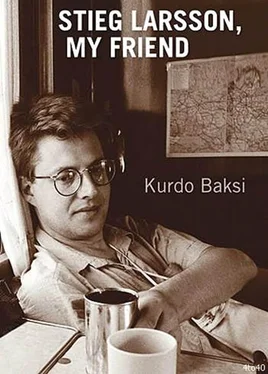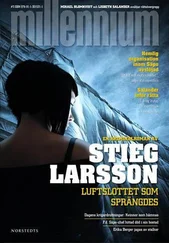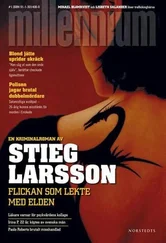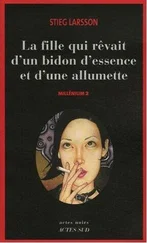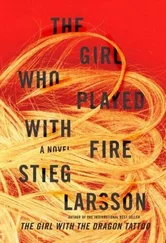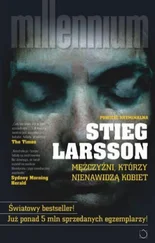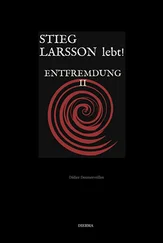Nevertheless, most of the articles are in his field of expertise: neo-Nazism and racism in Sweden and abroad. Three of them are about the bomb outrage in Oklahoma. Of course, there may be many more unsigned articles by Stieg, and one cannot exclude the possibility that several signed articles were overlooked during the scanning process (those who worked on it have admitted that T.T.’s repository of news articles is far from complete).
So, although he was fighting against the odds, Stieg hung on at T.T. He was pretty frank about his conviction that obstacles were constantly being placed in his way, not least because his superiors seldom allowed him to write about matters on which he was an expert. Nevertheless he never felt for one second that he was being victimized. Instead, he mounted counterattacks whenever opportunities presented themselves. He even went so far as to organize his own “resistance group” at T.T. This included several members of staff who got on well together and had more or less the same views on journalism. This group supported him when his superiors complained or prevaricated.
Now, many years later, I find it hard to understand why he behaved as he did. Why this constant battle? Couldn’t he have done what everybody else would have done and simply looked for another job? Sometimes I suspect he liked to create his own battlefield where he could leap up on to his horse and wield his sword and bayonet. The image of Don Quixote occasionally crops up in my mind’s eye.
Similarly, T.T. seems like a big windmill spinning round at a leisurely pace. Or perhaps a fan belt whizzing round out of sight inside an engine which ought to be changed after a certain number of kilometres but is still there. You almost get the feeling that the whole engine will grind to a halt when the belt eventually snaps. It often seemed as if those in charge at T.T. had no idea how to handle the bolshie employee from the far north who was at one moment an implacable warhorse and at the next moment more like a miserable schoolboy sulking in a corner of the playground. They never knew if he was going to do his own thing – and ignore their rules – or toe the line.
There is no point in suppressing the fact that on occasion Stieg stretched the rules to breaking point. For instance, as a T.T. reporter he wrote news items about having himself received death threats. Nobody at T.T. seems to have noticed. Or possibly they didn’t have the strength to argue with him and so turned a blind eye. A quick glance at T.T.’s archives shows that in his capacity as a member of the Expo editorial board, he “interviewed” himself five times in the period 1992-9.
It was precisely this lack of impartiality and relevance that made his position at T.T. so complicated. Such goings-on are far removed from what a news agency ought to be doing. But Stieg simply couldn’t help himself. The moment he sat down at a computer, he took sides for or against.
These facts make it easy to understand how Expo could have become such an important part of Stieg’s life. The number of articles he wrote for T.T. declined in inverse proportion to his increasing involvement with Expo . Perhaps, paradoxically, this was what forced him to stay on at T.T. He needed his salaried post because Expo ’s financial situation was always so awful.
Early on in our friendship I realized what the force was that drove Stieg: justice – irrespective of class, gender, ethnicity or sexual orientation. I couldn’t possibly count how many times he said “Everybody is worth the same as everybody else.” Over and over again. Most of us would agree, no doubt; but I have never heard that sentiment expressed with such emphasis and conviction. The concept of justice was an integral part of his being, I don’t know how else to describe it.
Like many others of his generation, Stieg had grown up with a political vision, in his case Trotskyism. But unlike quite a few of his generation, he never changed his views when money was involved. Financial matters simply did not exist in his conception of the world; he had zero interest in anything to do with money.
More important to him was the possibility of making a difference without being noticed. That is why it is extremely difficult to imagine how he would have handled his success as an author, forced to take a bow because of all the attention his novels had attracted. But he was a man who worked tirelessly to produce material for the rest of us to present to the general public. A man who wrote vast numbers of appeals and articles, and then asked me to attach my name to them.
I know that he thought about this because he had premonitions that the Millennium trilogy would be a success. However, for me – and for many others – the biggest question is not how he would have handled his success, but how on earth he managed to produce these books in more or less total secrecy, despite being so busy all the time.
I sometimes ask myself just how much Stieg worked. I generally answer, “I can’t say when he worked – but I can tell you when he didn’t work. When he was asleep.” I should perhaps mention that when he was not at the office, he was glued to his computer or had his mobile clamped to his ear – two indefatigable “collaborators” of Stieg’s.
When the time came for the first double edition of Svartvitt and Expo , Stieg had an unusually number of irons in the fire. He was fully occupied with contacting the parents of children who had been exposed to racist violence and with trying to find homes for women who had fled sects or families where they had been living under duress. He was also working intensively to arrange residence permits for homosexuals from Muslim backgrounds. He was helping others to finish books when they got stuck and couldn’t make progress. He was lecturing regularly to Swedish PEN, the Helsinki Committee and Scotland Yard. In addition to all that was the non-stop fund-raising for victims of racism.
Moreover, Stieg had started digging into an old legal case that later came to be called the Joy Rahman affair and that led to Rahman being released from prison in 2002 and awarded substantial damages. Rahman, employed as a home help, had been sentenced to life imprisonment in 1994 for strangling a 72-year-old woman she had been working for in southern Stockholm. Stieg was convinced that Rahman was innocent, despite the fact that the Supreme Court had rejected her appeal. He thought that as a journalist I ought to be able to establish Rahman’s innocence simply by reading all the legal documents carefully. He had dumped over a thousand pages of proceedings on my desk. I read all of them, but was not convinced that Rahman had been falsely accused. Stieg disputed my conclusion.
“You’re not going to win the major journalism prize,” he said.
But I couldn’t bring myself to query the legal process. There were too many details that seemed not to fit and far too many uncertainties. In 2007 the same Joy Rahman was imprisoned for the murder of a man in Bangladesh. I wonder what Stieg would have made of that.
Despite Stieg’s enormous workload, he always met his deadlines. He never failed to complete a text by the time it was needed. Mind you, whether the article was what had been agreed in the first place was another matter.
Time was beginning to run out for our first combined issue. It was to contain no more than eight Expo pages: a single-column leader, four news reports, a commentary and a review. Stieg’s article was still outstanding, and was essential if everything was to fit together with the Svartvitt material. That is what we had agreed, and it was important that nothing went wrong. We had too many critics just waiting to pounce if we made a mess of things. And we were in desperate need of new subscribers. In no circumstances must we publish late and give the impression of being unprofessional.
Читать дальше
